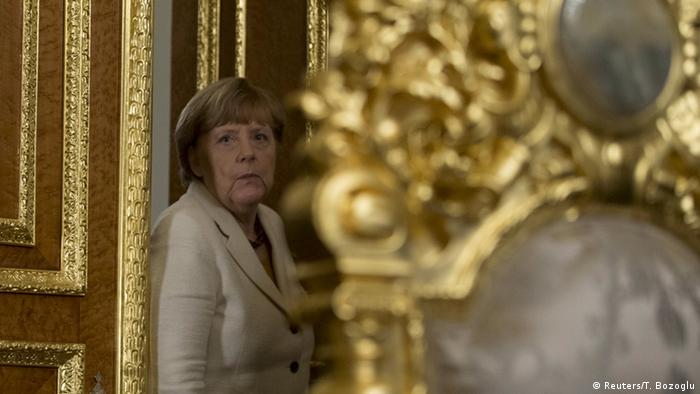Opinion: Merkel's mistimed visit
Opinion: Merkel's mistimed visit
The German chancellor's trip to Istanbul has come at the right moment for Turkey's ruling AK Party. But DW's Gunnar Köhne has his doubts whether Turkey is really interested in solving Europe's refugee problems.
The scene was meant to create a clear message: on one side, a woman who had come with a request. On the other, a powerful man with his hands firmly on the reins. While Turkish President Recep Tayyip Erdogan sat casually, with his hand dangling from the side of one of the arms of his golden chair, Germany's Chancellor Angela Merkel perched nervously beside him, wearing a frown. Throughout the meeting, Erdogan didn't give Merkel a single glance.
Whether Merkel's visit really was just about making a request will only become clear over the next few weeks. After all, no definite decisions came out of her meetings in Istanbul, just statements about planned courses of action. Turkey's government, for its part, has said that it is prepared to stop the refugees passing through its country – with money and assistance from the EU.
But how that is meant to happen seems unclear, if you look at a map of the country. Turkey's border with Syria is 800 kilometers long and is just as difficult to monitor as the country's winding Aegean coast, which faces Greece. The idea of having transit camps, which only a certain number of refugees will be allowed to leave in the direction of Europe, is also impractical. Only a small percentage of the two million Syrian refugees living in Turkey, are living in camps along the border. Most of them are in the big Turkish cities, or they are trying to travel onwards. How are you going to bring them back to the camps? Are they going to be brought back by force?
Mainly symbolism
For Turkey's help in the "containment" of the refugee problem, the German Chancellor has offered, on behalf of the EU, improvements in visa conditions for Turkish citizens traveling into the bloc. But this exists already for certain professions anyway, such as for business people or artists. In addition, Merkel announced that discussions on Turkey's entry into the European Union would start up again this year. But that is also just symbolic. When it comes to getting entry into the EU, it's not about how many times negotiations takes place, rather how often they end successfully. In the last ten years with Turkey that has only happened once.
Turkey doesn't just want to be acknowledged as a country that other nations can send refugees back to - and it also wants to be given status as a "safe country of origin." But is Turkey such a country really? In Angela Merkel's view, the answer is "yes" – she made that clear again during her trip to Istanbul. After all, this is a NATO partner and an EU candidate country. But, Turkey was also a NATO member during the brutal era of the military junta during the 1980s. And the EU entry talks started at a time (2004) when Turkey had just made far-reaching reforms and Erdogan's government was negotiating with the Kurds about peace.
Some 11 years later though, it is a different story. The civil war between the banned Kurdistan Worker's Party, the PKK, and the Turkish forces has started up again, and the muzzling of the press is so severe that international organizations are alarmed. And now: the terrorism on the streets is threatening to turn Turkey into a "typical" Middle Eastern country.
Appeal goes unheard
That's not what a "safe country of origin" should look like, say the 100 Turkish intellectuals who wrote an open letter to the German chancellor ahead of her trip. They urged her not to put her own domestic, political goals ahead of European values, such as the right to free speech and a free press - two concepts which are currently being disregarded in Turkey.
"Don't let your trip look like you are supporting any political campaign," the critics said. They, like many other Turkish democrats, however, ended up being disappointed. Merkel didn't mention human rights once in the press conference in Istanbul. Afterwards, Turkish Prime Minister Ahmet Davutoglu left the meeting and went straight to an election rally.dw de


Comments